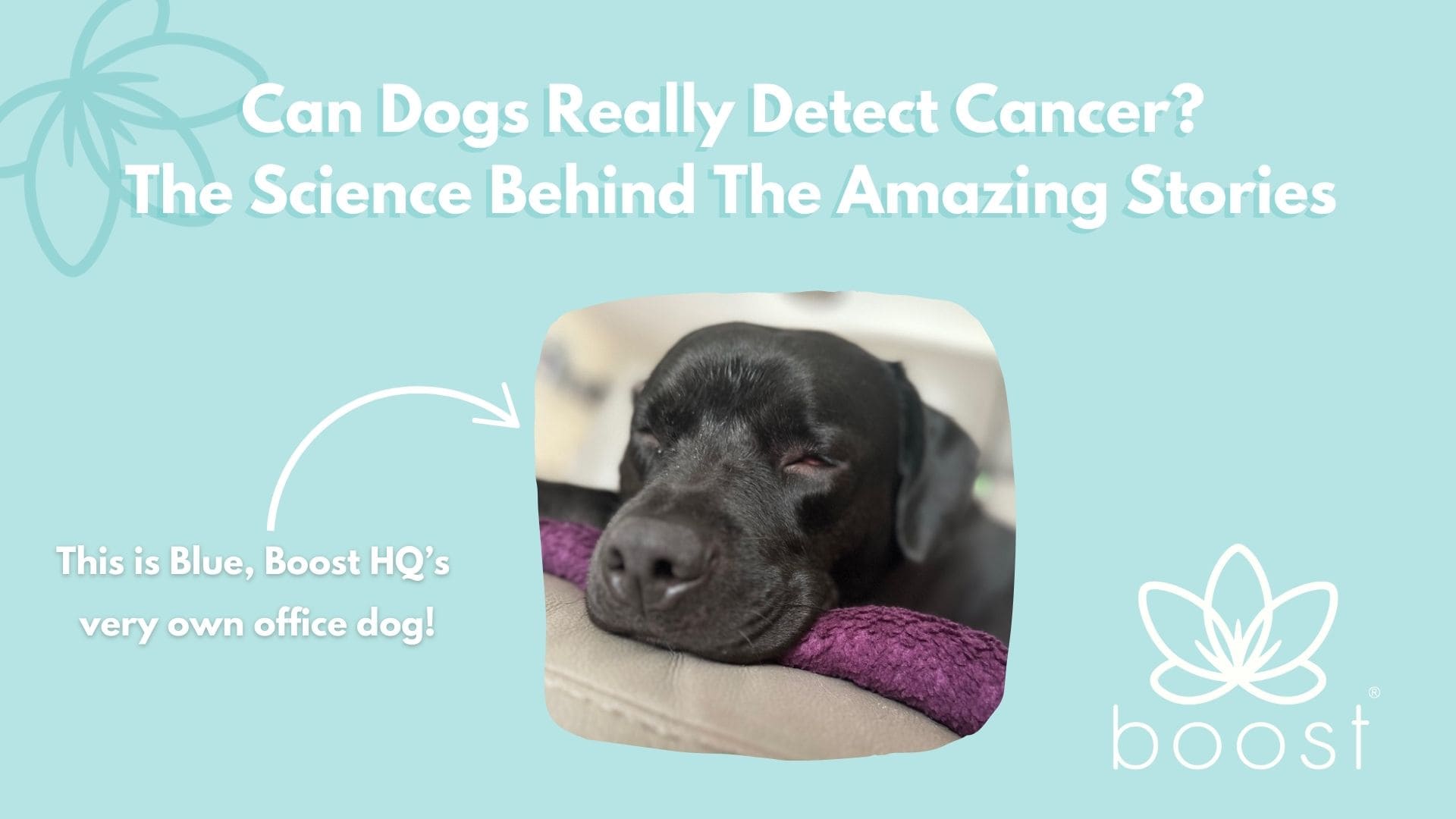We’ve all heard those incredible stories: a loyal dog starts acting strangely, fixating on a particular spot on its owner’s body—sniffing, pawing, or even licking—only for the person to later discover they have cancer. Sounds like something out of a movie, right? Well, these stories aren’t just urban legends. There are real-life accounts, and even some scientific research, that suggest dogs may have the ability to detect certain types of cancer, including breast cancer. And yes, we are dog lovers at Boost HQ, so we were intrigued!
Real-Life Anecdotes: How Dogs Alert Their Owners
Let’s start with the personal stories. We’ve recently spoken to a wonderful lady who told us the story of her dog, who pawed her breast in a specific spot causing a small, minor scrape. The scrape started to dimple inwards, so the lady went to the doctor to get it checked. It turned out that this exact spot was where she had a lobular breast cancer tumour, notoriously difficult to diagnose. While she had initially been angry with the dog for pawing her, she now believes he was trying to alert her to what was going on and is grateful that her breast cancer was diagnosed promptly. Many pet owners have shared similar experiences of their dogs persistently paying attention to a specific area of their body, only for that behaviour to lead to a life-changing medical diagnosis. Here are some common ways dogs seem to signal something’s wrong:
Persistent Sniffing or Pawing: One of the most common stories involves a dog becoming fixated on one spot, like the breast, often sniffing or pawing at it repeatedly. Later, this same area is diagnosed with cancer.
Licking or Nudging: Other stories tell of dogs gently licking or nudging a specific part of the body—again, this is sometimes the first clue that something more serious is going on beneath the surface.
The persistence of these behaviours often prompts the owner to seek medical advice, and in many cases, this has led to the early detection of a tumour. It’s incredible, but is there any science to back up these claims? We had a look.
The Science: Can Dogs Actually Smell Cancer?
While these stories are heartwarming and impressive, they aren’t always a fluke. Science backs up the idea that dogs can detect certain types of cancer, thanks to their extraordinary sense of smell. Here’s what the research says:
Dogs and Their Superpowered Noses
To put things in perspective, dogs have roughly 300 million olfactory receptors, compared to a human’s mere 5 million. This gives them an unbelievable ability to pick up on subtle changes in the environment—like the scent of volatile organic compounds (VOCs) released by cancer cells. These VOCs can be present in breath, urine, sweat, or tissue samples, and some people think that dogs can detect them long before humans would even know there’s a problem.
Studies That Prove It
Several studies have proven that trained dogs can detect cancer with a surprising level of accuracy. Here are some standout findings:
Breast and Lung Cancer Detection (2006): A study published in Integrative Cancer Therapies found that trained dogs could detect breast and lung cancer by sniffing patients’ breath samples. Their accuracy ranged between 88-97%, which is pretty impressive!
Bladder Cancer Detection (2004): Another study in The British Medical Journal showed that dogs could detect bladder cancer by sniffing urine samples. The accuracy rate was around 41%, which may not sound as high, but it’s still much better than chance.
These studies show real potential for dogs to aid in cancer detection, but there’s still a long way to go before they’re a regular part of clinical diagnosis.
Current Limitations: Why Dogs Aren’t in Doctor’s Surgeries (Yet…)
As cool as this all sounds, dogs aren’t exactly hanging out in oncology wards or Doctor’s surgeries just yet. There are obviously barriers to making this a routine part of medical practice:
Inconsistent Results: Not all dogs are equally good at detecting cancer. Some dogs are better sniffers than others, and results can vary.
Lack of Standardization: Training methods for cancer-sniffing dogs are not yet standardized, which makes it hard to ensure reliability across the board.
So while the research is promising, we’re not quite there yet in terms of using dogs as an official diagnostic tool. But who knows? With more studies and better training techniques, we might one day see dogs playing a crucial role in early cancer detection.
The Bottom Line: Dogs and Cancer Detection—A Work in Progress
At the end of the day, the idea that dogs can detect cancer is both heartwarming and scientifically supported. While many pet owners have personal stories of their dogs alerting them to cancer, and studies back up these abilities, we’re not sure this will really become a key part of medical practice any time soon.
However, the next time your dog starts acting a little strange, maybe pay closer attention—they just might be trying to tell you something important!
Want to read on and find out more about dogs and cancer detection? Check out Cancer Research UK’s blog all about it here: https://news.cancerresearchuk.org/2009/02/03/can-dogs-detect-the-smell-of-cancer/.



![NHS Innovation Accelerator Logo 2024 [White, Transparent Background]-min NHS Innovation Accelerator Logo 2024 [White, Transparent Background]-min](https://wewearboost.com/wp-content/uploads/2022/05/NHS-Innovation-Accelerator-Logo-2024-White-Transparent-Background-min.png)

